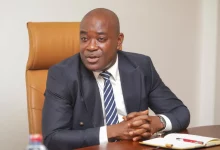Nine people have died in the East Mamprusi, West Mamprusi, Mamprugu/Mongduri and Chereponi districts, all in the North East Region following the recent flood disaster in the region.
The flooding had resulted inrising level of water in streams and rivers, destruction of houses and farmlands and other private and publicproperties, as well as displacement of people, which forced some residents to fleeto various safe places.
Mr. John AlhassanKwaku, the North East Regional Co-ordinator of the National Disaster Management Organisation (NADMO),confirmedthis to Ghanaian Times yesterday.
He explained that peoplehave drowned when the canoes in which they were crossingthe streams to their various destinationscapsized.
It must be noted that disasters can be natural or human-induced, which most of the times can be prevented.
However, the Ghanaian Times would continue to agree to the fact that it is not possible to prevent natural disasters but we can take steps to escape their effects or mitigate them.
These include prevention, mitigation, preparedness, response and recovery.
Prevention has to do with identifying potential hazards and devising safeguards to mitigate their impact and this must include Implementing an evacuation plan, while mitigation involve all actions to minimize the loss of human life.
Preparedness is where individuals, communities, businesses and organizations are helped to plan and train for what they have do in the event of a disaster, with response being what is done after the disaster, both short- and long-term, while recovery involves.stabilising the area and restoring all essential community functions.
The country’s NADMO was established by Act 517 of 1996 to manage disasters and similar emergencies in the country.
It is expected that certain relevant knowledge skills are needed to effectively prosecute that mandate.
This is important because disasters come in different forms and kind like floods, fires, earthquakes and mass killing and NADMO officials have to collaborate with all other organisations involved in disaster management like the fire service, the police, health authorities and even meteorology officials and be able to coordinate their activities.
If this is the case, then it means NADMO should have officials who can boast expertise in disaster management in order to deal with disasters as expertly as the situation demands.
However, we can argue that our situation falls short of the standards because NADMO is full of party boys whose appointments are rewards for their contribution to bringing their party to power and who are usually dismissed upon change of political power.
NADMO is so criticalan organization to be run that way, which is why even basic steps to prevent the effects of disasters or mitigate them are arguably absent in the country.
Disaster management is a continuous activity that must not be relaxed at any point but we see NADMO officials at work mostly when disasters strike, when they usually come in to offer relief items.
This should stop. Disaster education, for instance, must be run continuously in flood-prone areas, for instance, while steps are taken to prevent people to settle in certain places like water-logged areas.
The truth is that with the pressures of population growth with people seeking land for various purposes, vulnerable people would be forced to live or farm anywhere for survival, even if they know disaster would strike there.
The Ghanaian Times, therefore wishes to appeal that the needful must be done before, during and after disasters to save life and property and to restore life to some comfort.
This can be effectively be achieved when NADMO is constituted as a professional organization with experts to run it, not party boys.
The needless deaths due to disasters are becoming too many and NADMO can be blamed for some level of negligence.





